John Berry on CFN Live
June 27, 2025
Our National President John Berry was a guest on Catholic Faith Network to talk about the Society of St. Vincent de Paul and our nationwide campaign on homelessness prevention.
June 27, 2025
Our National President John Berry was a guest on Catholic Faith Network to talk about the Society of St. Vincent de Paul and our nationwide campaign on homelessness prevention.

Every day, Society of St. Vincent de Paul pharmacist Kellie Elisar sees the fallout of a broken system: Patients who can’t afford insulin, seniors choosing between blood pressure medication and groceries, grieving spouses who can’t pay for prescriptions.
“I find some days I’m a sister, sometimes I’m a mother, and sometimes I’m a social worker,” says Elisar, who is in charge of SVdP’s charitable pharmacy in Baton Rouge, La. “It just depends on the day and the need that the patient has.
“Today, we had a gentleman that came in and he lost his wife. Financially, things just completely changed for him. He was so used to having extra Social Security income from his wife, and they would pay everything together. And then, ‘Whoa, now what do I do?’”
At a time when soaring drug prices remain a major political issue, SVdP’s innovative charitable pharmacies have long been working at the grass roots to address the immediate needs of people in places such as Baton Rouge, Dallas and Cincinnati. It’s in these facilities that hope beckons for people whose day to day lives are overshadowed by the need to pay for medicine.
“Medicine or food, food or medicine. When you’re making those kinds of choices, it’s not really a choice,” says Michael Acaldo, Society of St. Vincent de Paul USA’s National Chief Executive Officer.
When he was the president and CEO of the Greater Baton Rouge Council in 1995, he encountered too many people forced to make such a choice.
“Back in 1995, there was no Medicare Part D,” he said. “Even on just regular Medicare and other income, they could have prescription medicines that cost more than their entire monthly budget combined.
“If it’s a chronic disease, their call isn’t just for help today or this month. It becomes a long-term problem.”
Acaldo organized his Baton Rouge team to create SVdP’s first charitable pharmacy, one whose concept of long-term free pharmaceutical support has now spread nationally. Sometimes people walk in to the pharmacies. Other times, Vincentians discover the needs of people during one-on-one Home Visits with the people they serve.
“What a powerful opportunity [when we] fill that prescription every month. That is a heart, soul-driven activity because that is us really connecting with Christ.”
The work couldn’t be done without people, companies and organizations that are generous with their treasure, their time, and – yes – their pharmaceuticals.
“On a daily basis, we are getting donations from the public (and) nursing homes,” Elisar says. “They had somebody that passed away, or they had mail order sending me bottles of medicine where people don’t know what to do with them because their insurance covers it and they call and ask if we can use it.
“We put dates on them and make sure that everything is compliant with the pharmacy board. That allows me to have the access to be able to fill prescriptions that are very, very expensive.”
Elisar, her team of two staff and about five volunteers have a daily encounter with Christ through these recipients.
“I’ve literally had somebody come in and they said, ‘Thank you for being kind. Nobody has been kind to me today.’ I’m getting chills just thinking about it. How did you not see Christ in every single person that walks through this door?”
Cincinnati Builds a Legislative Path
This innovative model was eventually adopted by SVdP Conferences and Councils across the country and even helped inspire legislation in Ohio to open the door for charitable pharmacies.
“We were meeting with our neighbors and learning more about some of their challenges,” says Brad McMonigle, CEO of St. Vincent de Paul Cincinnati. “It became a pattern where they were having to choose between buying food, paying rent, taking their medication as prescribed or not taking it at all.
“The leadership in Cincinnati actually assisted in drafting a bill in Ohio to allow for charitable pharmacies. That bill was passed, and in 2006, the charitable pharmacy in Cincinnati was launched.”
Originally, the Cincinnati effort led to 7,000 prescriptions filled in the pharmacy’s first year. Now, the Cincinnati pharmacy is on target to reach its 110,000th prescription this year.
“We will fill their first 30 days with very little questions asked, because we know that they’re not coming with all their paperwork, all their proof of income. They’re just coming in in desperate need,” McMonigle says.
“We will schedule an appointment for them to come in with all that requested information, to see if they then are approved for ongoing care. Once they come under our care, we’ll serve them until they either are able to obtain insurance or they have a better income.”
Offering Spiritual Medicine
The SVdP Dallas pharmacy started similarly through the work of one longtime Vincentian, Hank Herman, whose dogged work with state legislators allowed Saint Vincent de Paul North Texas to open its doors in 2018 and offer more than 400,000 free prescriptions in seven years.
“It’s one of those things where we know that we literally are saving people’s lives because of the medications that we’re giving,” says Luis Gonzalez, CEO of St. Vincent de Paul North Texas.
“We have one patient, a young adult diabetic. We’ve been taking care of her since she was 15 years old. Last year, she told us, ‘I’m going to college because you saved my life. I can go to college and have a life because you’ve been taking care of me and giving me medications.’ Those kinds of things happen to us all the time.”
To maintain and expand their reach, such innovative ministry needs financial support, the kind that Gonzalez says brings an incredible return on compassionate investment.
“The value of these medications, from a pure financial standpoint for an investor, a dollar in is about $35 to $40 worth of value going out the door because of the value of the medication,” he said.
That’s beyond the spiritual medicine that people like Elisar and her team, and similar St. Vincent de Paul pharmacy teams, offer those in need.
There are now seven St. Vincent de Paul charitable pharmacies across the country that provide long-term low-cost or free pharmaceutical support to their communities. SVdP pharmacies can be found in Atlanta, Baton Rouge, Biloxi, Cincinnati, Dallas, Houma, Madison, and Monroe. Access to health care has completely transformed the lives of those in need.
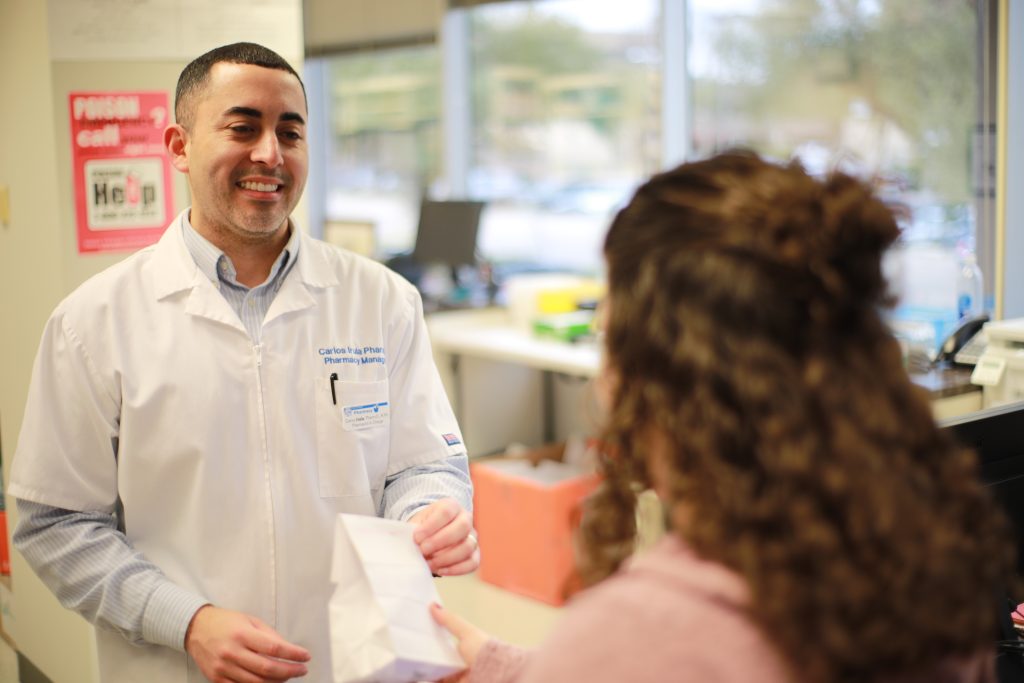
Click on the following links to learn more about St. Vincent de Paul charitable pharmacies:
– Atlanta | Baton Rouge | Biloxi | Cincinnati | Dallas | Houma | Madison | Monroe
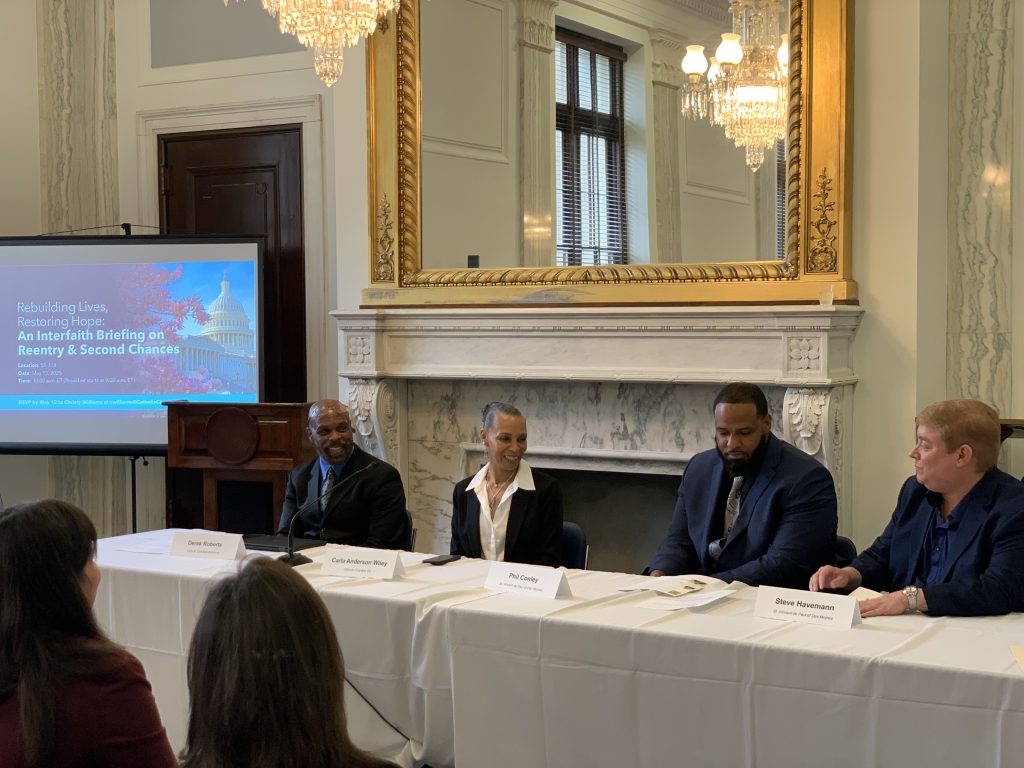
Phil Conley didn’t grow up expecting to speak in the halls of the U.S. Senate. Raised on the South Side of Chicago, he lost his father at a young age and saw violence, drugs, and incarceration shape nearly every aspect of life around him.
“The only thing I saw getting rewarded was violence,” he said. “A lot of people that worked in my family sold and used drugs. I didn’t see many people working jobs or going to church.”
But on May 13, Conley flew from Des Moines, Iowa, to Washington, D.C., to do something he never imagined—share his story with congressional staffers in the Russell Senate Office Building and advocate for the re-entry programs he now helps lead as a mentor.
The event, hosted by the Society of St. Vincent de Paul USA (SVdP), Catholic Charities USA, the National Religious Campaign Against Torture, and the Jesuit Conference Office of Justice and Ecology, brought together more than two dozen Senate staffers and policy stakeholders to hear firsthand how second chances, when rooted in faith, dignity, and real support, can break cycles of incarceration and restore lives.
The event was a powerful introduction to SVdP’s growing advocacy presence in Washington, made possible by the organization’s new national office and the recent appointment of Ingrid Delgado as National Director of Public Policy and Advocacy. SVdP opened the office in April to advocate on issues related to poverty, homelessness, and the needs of vulnerable populations, including support for faith-based re-entry programs. SVdP is using its platform as one of the largest charitable organizations in the country—serving more than five million people annually through person-to-person assistance, housing programs, food support, disaster relief, and more—to shape federal policy.
Conley’s remarks highlighted not just his own journey, but the importance of lived experience in informing policy. Now a business owner, father, and mentor, he continues to walk alongside others returning home through SVdP’s Immersion Program in Des Moines, a Second Chance Act grant recipient.
Steve Havemann, CEO of SVdP Des Moines, emphasized just how impactful that program has been.
“The state’s average recidivism rate is 45%,” he said. “For our Immersion Program, it’s 18%.”
The program focuses on the first 72 hours after release, providing returning citizens with housing, mentorship, job readiness, and community support.
“Poverty can be a full-time job,” Steve said. “If we want to break cycles, we have to invest in people, not just systems.”
That message reflects SVdP’s Vincentian model. The work of the Society’s more than 90,000 volunteers is built on one-on-one relationships. Whether it’s helping someone return home after incarceration or assisting a neighbor with rent or food, SVdP believes in meeting people where they are, offering support, dignity, and hope without judgment.
The panels brought SVdP’s values to life through powerful, personal testimonies. Johnny Perez, Director of the U.S. Prisons Program at the National Religious Campaign Against Torture, spoke about the lasting trauma of solitary confinement and why humane, faith-led solutions are essential. Courtney Everett, Director of Finance and Development at Saint Louis University’s Prison Education Program, urged attendees to support the reauthorization of the Second Chance Act and shared how education transformed his own re-entry journey.
Conley participated in the second panel, which continued the conversation through lived experience. Carla Anderson (Wiley), now Program Manager at Catholic Charities, offered her perspective on the challenges women face post-incarceration, describing the simultaneous pressures of finding housing, employment, and regaining custody of children. Derek Roberts, founder of Ageless Generations, and Steve Havemann rounded out the discussion with reflections on what’s working and what still needs to change.
“Faith-based organizations like SVdP don’t just advocate from a policy platform. We advocate from lived experience and deep relationships in communities across the country,” said Ingrid Delgado, SVdP’s National Director of Public Policy and Advocacy. “That’s what makes our voice in Washington both credible and urgently needed.”
The message from every speaker was clear: faith-based re-entry efforts work. Panelists pointed to the unique role faith communities play in offering long-term accompaniment, moral clarity, and a sense of hope, especially for those society often overlooks.
These are the kinds of community-rooted, person-centered solutions SVdP advocates for through legislation like the Second Chance Act, through national partnerships, and by ensuring that policymaking includes the voices of those with lived experience.
As SVdP expands its national advocacy, these are the voices it’s bringing to the table.
“If you had told me 15 years ago this would be my life, I wouldn’t have believed it,” Conley said at the close of the event. “But now I’m living it. And I’m not stopping here.”
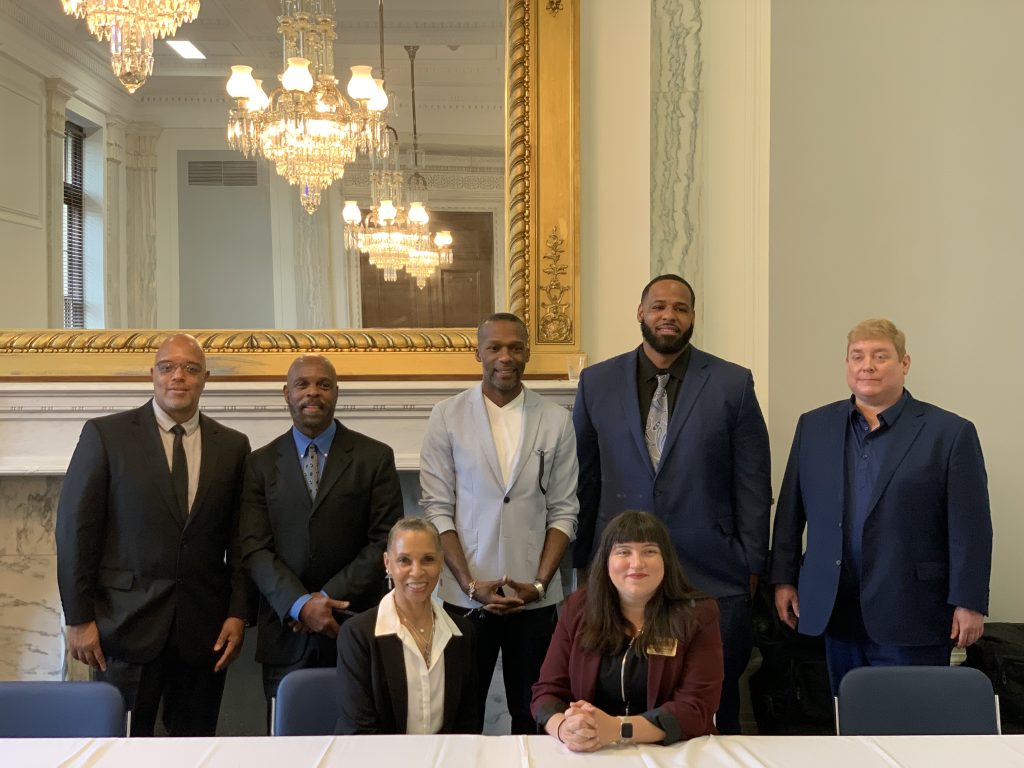
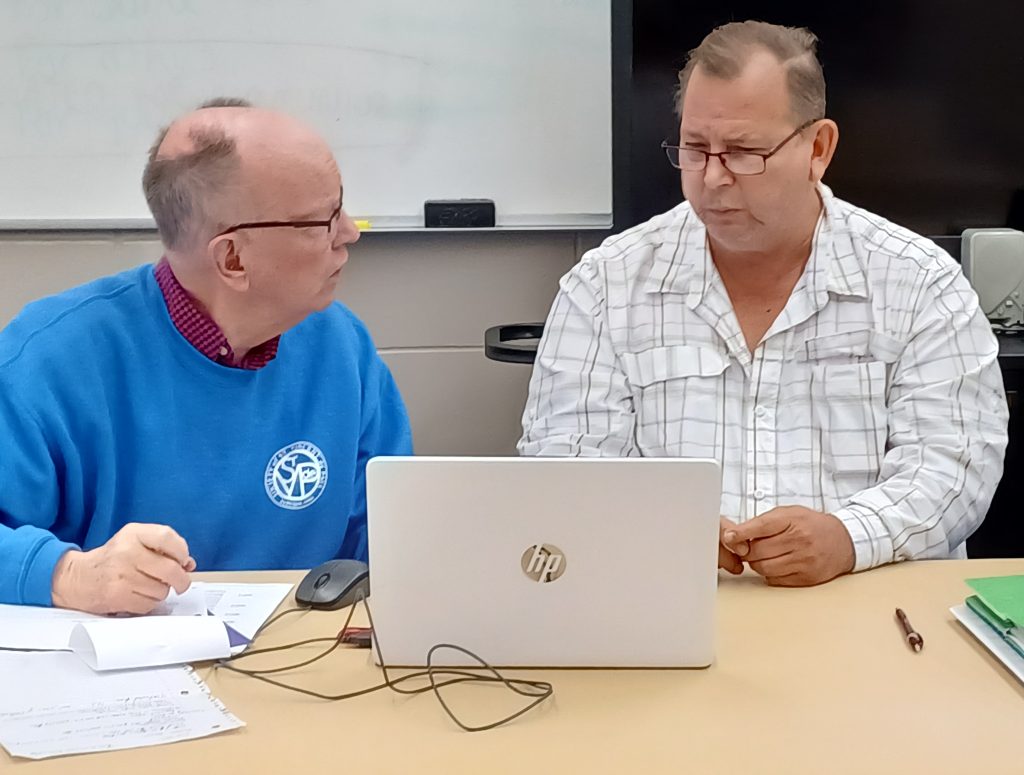
In 2017, two years into his tenure as CEO of the Society of St. Vincent de Paul (SVdP) in Des Moines, Iowa, Steve Havemann had an eye-opening realization: 34% of the people being served by SVdP Des Moines had been incarcerated at some point in their life.
That’s just the tip of the iceberg. The 6th Avenue Corridor in Des Moines — a community served by SVdP — is the most impoverished and underserved in the city, according to Havemann. It is the least accessible by transportation, has the highest crime rate, and has an average household income of about $11,000.
Not only is it hard to find jobs there, but those who are unemployed, ironically, can’t afford to get a job.
“You have workforce training programs that are 8-12 weeks long and are unpaid,” said Havemann. “So, people are asking themselves, ‘How am I supposed to buy dinner tonight? How am I supposed to survive until Friday? My entire day is consumed and I’m not making any money for 12 weeks.’”
That’s when SVdP’s Back2Work program was born. Back2Work provides customized training, continuing education, community resources, and connectivity for people on the journey to reemployment, all while providing a livable wage. The 1.5-week program connects individuals impacted by incarceration, poverty and homelessness with entry-level opportunities in pre-apprentice, apprentice, and journey career pathways.
Since piloting in Des Moines, Back2Work has been adopted across the country by SVdP Councils in major cities such as Seattle, Oakland, Baltimore, Orlando, Milwaukee, and more. Thus far, SVdP Des Moines has served almost 270 people through the program, ranging from younger adults — many without parents — to older adults who are struggling to provide for their families.
“Back2Work was really born out of listening to the concerns of our communities and asking questions, not being prescriptive,” said Havemann. “It wasn’t, ‘I’ve got the answer for you,’ but rather, ‘What if we work together and changed how we offer services?”
Individuals begin the program with résumé building and learning soft skills like financial literacy and career readiness. As the program progresses, they continue to build upon those skills and receive job shadowing opportunities at various employers. The final stages involve participants engaging in mock interviews, giving a recorded presentation to their peers, and fully transitioning into their new jobs.
The participant-to-employer relationship is further reinforced through SVdP Des Moines’ employer council. This network of 34 employers meets three times a year to advise on the Back2Work program, as well as communicating the progress of program graduates they’ve recently employed.
“That’s really one of the big things that is significant about this program — the follow-up piece, checking in and making sure everything is still going well for our former participants. If not, and sometimes that is the case, we provide interventions to help guide them towards success.”
Havemann and his 140-person team helped SVdP Dubuque, about three hours northeast, , adapt their own Back2Work program in late 2023. Led by Cindy Kohlmann, Director of Programming Services, SVdP Dubuque’s iteration of the program has served 70 individuals thus far, ranging from age 18 to 64.
SVdP Dubuque’s program emphases life skills training like cooking, saving money, and teamwork. Sessions feature guest speakers, including executive leadership from various employers.
Kohlmann said it’s not just about bridging access back to employment for these vulnerable individuals, but also giving them the confidence and tools needed to stay at work.
“Lots of times when the question is asked, “How do we get people out of homelessness?” the fast answer is that we get them a job. But that doesn’t solve all of their problems,” Kohlmann said. “SVdP’s Back2Work program addresses more than just work. It addresses things like communication, nutrition, and spirituality.”
One woman from Dubuque had a track record of impressive jobs which paid her generously, but couldn’t keep those jobs because of relationship issues with her colleagues, according to Kohlmann.
“She didn’t know how to relate to a manager or coworkers, which ultimately cost her all of these wonderful jobs.”
The woman enrolled in the Back2Work program last November, which helped her finetune interpersonal communication and relationship skills. She graduated from the program, landed a job, and is still with the employer today, said Kohlmann.
One man went from part-time dishwasher to full-time supervisor, thanks to the program. He had done three tours of duty in Afghanistan and went through the military’s reentry program, but nothing worked. He then got into trouble and spent 18 months in prison. Now, he is successfully reintegrated into the community, thanks to SVdP.
Kohlmann said everyone deserves a chance, even those at their lowest.
“I get a little emotional and a bit passionate about this because people tend to believe that there are throwaway people, and I don’t believe that.”
Said Havemann, “If they believe that they need assistance but lack the confidence or competence within themselves to go forward and excel, that’s part of our mission … to jump in and fill that gap.”
SVdP Des Moines recently received a federal block grant that will allow it to combine Back2Work with its IMMERSION/Reentry program, which provides mentorship and resources to returning citizens from incarceration. It is also pushing for funding to collect data and become registered as an evidence-based practice.
“The thing to remember is that it’s not just the participants themselves who benefit from our programs, but also their families, friends and surrounding communities,” Havemann said.
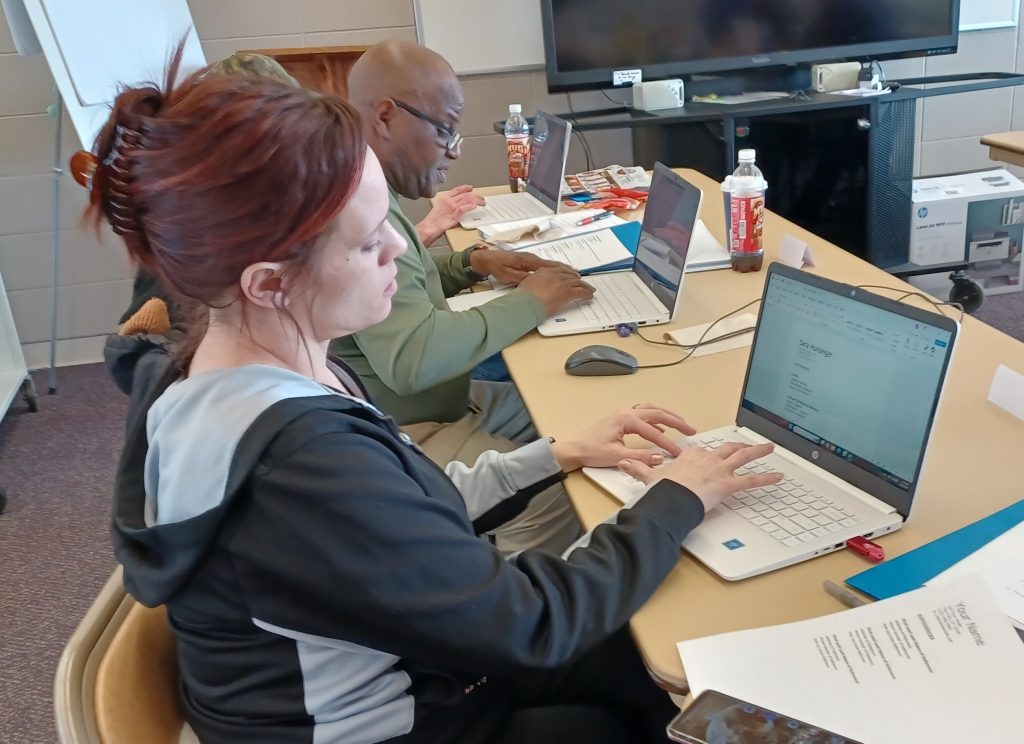
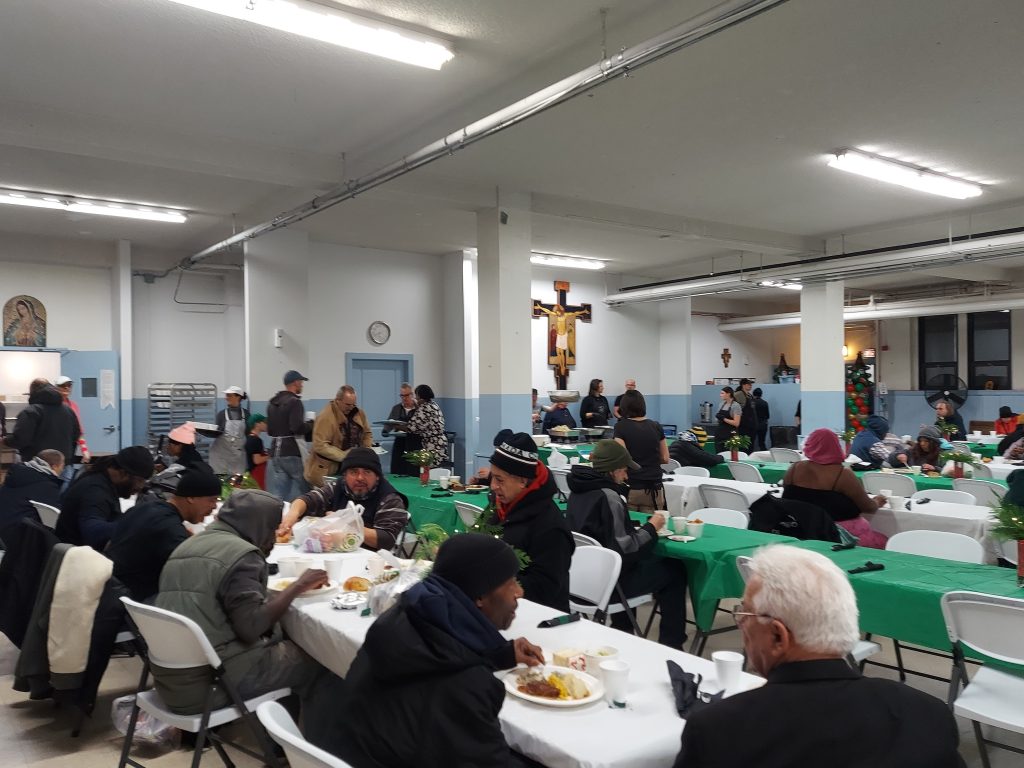
When Meghan McKern joined the Society of St. Vincent de Paul (SVdP) in Chicago, she wasn’t sure how she could help. As a fine dining chef with years of experience in Michelin-starred restaurants, she wondered how her skills fit into the hands-on, person-to-person service that defines Vincentian work.
“I’m not an academic,” she said. “But I’m a laborer. I wanted to do something real. I just didn’t know what.”
That changed after a simple moment — loading a car with donated supplies alongside Pam Matambanadzo, President of the Mary, Mother of God SVdP Conference in Chicago.
“She told me, ‘Everyone brings their talents. You just need to do whatever you’re comfortable with,’” Meghan said. “That opened the door.”
Together, they began to imagine what it could look like to offer not just a meal — but an experience rooted in dignity, community, and celebration. That conversation sparked A Seat for Everyone, a special New Year’s Eve dinner co-hosted with St. Thomas of Canterbury Soup Kitchen for about 100 guests, many of whom were experiencing homelessness. This is just a small fraction of about 5 million vulnerable individuals that SVdP serves per year.
Pam and Meghan didn’t want to serve just any meal. The goal was to create an experience that reflected a family-style holiday meal. With Meghan’s culinary background, she created a menu featuring braised beef, mashed potatoes, green bean casserole, corn, and carrots slow-cooked in the pan gravy. Dessert? Costco cake — at the special request of one of the regular soup kitchen volunteers.
The dining room was transformed. Balloon arches framed the entrance. Tables were covered in cloths and adorned with handmade centerpieces. Volunteers served the meal, plated with care, rather than handing out food in containers.
“For a lot of folks we served, New Year’s Eve used to be a time to gather, celebrate, dress up, go out,” said Pam. “Now, for many, it’s about survival — figuring out where they’ll sleep, how to stay warm. This night gave them a memory. A moment of joy and normalcy.”
Each guest also received a hoodie designed with original artwork by the parish pastor and sponsored by parishioners for $35. The garments were a gesture of warmth and welcome during the coldest time of year.
“There was one man who came in and just kept asking, ‘Is this really for us?’” Pam said. “He said, ‘Thank you for seeing us.’ That stayed with me.”
For Meghan, the night was transformative — not just for the guests, but for herself.
“Planning the dinner brought me back to my faith,” she said. “I realized I didn’t have to be perfect. I just had to show up. God would carry the rest.”
She spent most of the night in the kitchen, rotating dishes, checking trays, and making sure everything came out just right. Though she didn’t see many reactions firsthand, she heard stories in the days that followed about how the guests had felt honored, how the soup kitchen volunteers welcomed the collaboration, and how people kept asking when it would happen again.
Meghan remembers one helper in particular.
“I put a message out on the Nextdoor app asking for help,” she said. “Jess responded without asking for details — she just said yes and showed up.”
Meghan called her “a little angel.” Jess became her sous chef for the night, helping to prep and serve food throughout the evening. The two bonded over the experience, discovered they lived on the same street, and have since become friends.
“I think the Spirit was present,” Meghan said. “We were trying to serve others with care and intention, but we were also sitting at that table ourselves. It wasn’t us and them — it was just us.”
Plans are already underway to bring A Seat for Everyone back for Thanksgiving.
“Meals like this remind us what Catholic social teaching looks like in practice,” said Pam. “It’s not just about feeding people — it’s about reminding them they matter.”
Op-Ed Published 4/25/2025 in Real Clear Religion. Submitted by John Berry, National President of Society of St. Vincent de Paul USA
Why should a Catholic charity involve itself in advocacy? “Stay out of politics,” many would say. If you want to help the poor, stick with works of charity. Leave it to the experts to address the issues that cause or perpetuate poverty, dependency, and need.
As the president of the Society of St. Vincent de Paul (SVdP) USA — one of the largest religious charities in the country — I feel the weight of this question acutely.
At SVdP, we serve those in need without regard for their demographics or creed, no matter what political party is in power. But increasingly, I am convinced that the work of charity cannot, and must not, be neatly divided from the claims of justice. In other words: While SVdP is not a political organization, our work and our faith demand that we advocate for those living in poverty.
In America today, more than a half a million people every night experience homelessness. That number is rising, and the face of poverty is changing; seniors, women, single parents, and the displaced middle class have become a larger part of the more than 5 million people we serve every year.
A recent client at an SVdP in a Midwestern city exemplifies this trend. For years, Scott had worked hard and lived comfortably in the same home. Then his work hours were cut and his health declined; he had to assume primary caregiver responsibilities for his 80-year-old father and a fire forced them to leave their home. Just like that, he was facing homelessness and came to St. Vincent de Paul with nowhere else to go.
As Christians, we cannot simply walk by when we encounter suffering. We are called to act. But what kind of action is called for?
“It is too little to relieve the needy day by day,” wrote Blessed Frédéric Ozanam, the founder of the Society of St. Vincent de Paul. “It is necessary to get to the root of the evil, and by wise reforms to diminish the causes of public misery.”
Ozanam famously compared the work of charity to “the Samaritan who pours oil on the wounds of the traveler who has been attacked,” before adding: “It is justice’s role to prevent the attack.” The personal encounter with our neighbor in need must propel us into action. Charity alone is not enough. We must become fighters for justice.
I am not simply making a “treat the root causes” argument for why religious charities like the Society of St. Vincent de Paul should not shy away from pursuing policy change. I am saying we have a particular responsibility to advocate on behalf of those we serve. Why? Because the people best equipped to craft policy changes that will truly help the poor and suffering are those who have personally served them, spoken with them, listened to them.
It is with this responsibility in mind that the Society of St. Vincent de Paul is opening a second National Office, in Washington, DC. We will increase our efforts to advocate on behalf of those we serve and turn our focus more intensely towards the pressing issues of our time, particularly the scourge of poverty and homelessness that afflicts far too many of our fellow Americans. Recently, for example, we urged Congress to expand the Child Tax Credit. We also spoke out against cuts to the U.S. Department of Agriculture’s food purchase program for schools and foodbanks.
In so doing, we are not drifting from the proper scope of our mission: We are focusing it. SVdP volunteers across the country spend countless hours each year in service to those living on the margins. We don’t come to understand the situations of neighbors in need from books or think tank sessions. We learn by being with them, suffering with them, praying with them, caring for them, loving them. The direct relationship we have with our neighbors in need gives us perspective and insight that we must share with policy makers, like-minded nonprofits, and other organizations to help drive change.
In other words: Charity must lead us towards justice. The personal encounter with those in need obligates us to advocate on behalf of those we serve. If we understand the root of their struggles and yet do nothing to help address the underlying causes, how is that any different from seeing them hungry or cold and refusing to provide them food or warmth?
“When we have fulfilled this ministry, not for a few months, but for many years,” the Society of St. Vincent de Paul’s founder wrote, and when we have cared for those in need “at home, at school, at the hospital, not in one city only, but in many . . . then we begin to know the elements of this formidable problem of misery; then we have the right to propose serious measures, and instead of frightening society, we give it consolation and hope.”
So many struggling Americans need consolation and hope today. Those who serve them in charity must not hesitate to advocate on their behalf for justice.
It’s hard to imagine what to do next after finding out that 1,300 kids in your local school district are homeless.
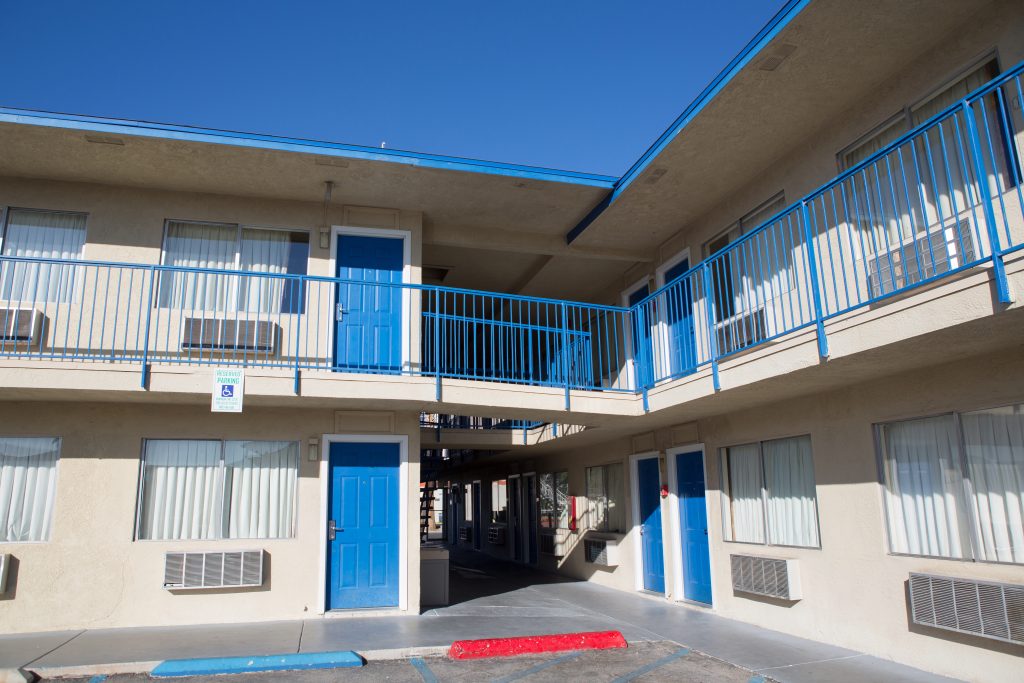
But Dan Kearns, Executive Director of the Society of St. Vincent de Paul (SVdP) Richmond Council, acted quicky. After learning last fall from Henrico County Public Schools that 113 of those students live in motels, Kearns and his Council extended a hand almost immediately.
Extended stay motels have become the only semi-stable housing available to many families living in poverty. If a family has been evicted, it can be hard for them to find another landlord who will rent to them. They sometimes end up in motels where, yes, they have a roof over their heads—but conditions are cramped, kitchens are almost non-existent, and the high living cost means it’s all but impossible to save towards a deposit on a more sustainable living situation.
“We knew there was a challenge – how do we help these people living in motels?” Kearns said. “And we knew that SVdP Georgia already had a program that served this population, so we mirrored it exactly after theirs.”
That program is Motel to Home, where SVdP staff and Vincentian volunteers provide financial assistance to families living in motels so that they can move into more stable housing. SVdP Richmond tailored the program to fit local needs, and since the program’s inception last October, they’ve worked with five families – three of which have moved into permanent housing.
Motel to Home is just one of many programs offered by SVdP with a focus toward homelessness prevention across the country – keeping families secure so that they don’t end up on the street. Among them are Home Visit Encounters – the heart of SVdP’s services – food pantries, shelters, thrift stores, dental clinics, charitable pharmacies, and much more.
Last year, SVdP USA served 5 million vulnerable individuals.
“I always look at SVdP as kind of the first responders to poverty,” Kearns said. “A lot of other organizations act almost as the extended care hospital, but what about people who are in an emergency? They can’t wait two or three weeks to get a phone call back. And I always say SVdP is really good at that – keeping the patient alive until we can figure out the root causes of their illness.”
A family must have income to qualify for the Motel to Home program, according to Kearns. When sitting down with the families to look at potential homes, SVdP recommends a monthly rent of about 40% of the family’s monthly income.
“We want you to be sustainable going forward,” he said. “We want you to stay in this home. So, at its core, a lot of it is financial counseling and direction.”
Take Tawanda from Richmond, for example. Mary’s Choice, a local faith-based organization that provides housing assistance, reached out to SVdP to ask that they help Tawanda and her two sons move into a home. They were all living in a motel at the time, and one of the sons was expecting with his girlfriend. Kearns sat down with the family, looked into an application, and discussed finances.
Once they determined the monthly rent the family could afford, Kearns and his team helped Tawanda and her sons move into a suitable home over the holidays. But that’s not all – they also helped furnish the home with brand new mattresses from a local SVdP thrift store.
Kearns still regularly checks in with Tawanda’s family.
“These individuals aren’t just a number. We don’t say, ‘Here’s your assistance … see you next month or maybe never again. Our services are efficient, but we also make it personal.”
Other SVdP Conferences across the country also help struggling families transition from motels to stable housing. The SVDP Conference at Sts. Joseph and Paul Catholic Church in Kentucky recently helped a mother and two sons move from a motel into a home and also secured a job for the mother. SVdP St. Louis, with the help from the St. Patrick Center and local parishes, raised funds to help a mother pay off a lingering hotel debt and move into a new home with her children. She was also given thrift store vouchers to furnish the home.
“We start with the heart here at SVdP,” said Kearns. “We don’t care what your situation is – we will figure it out. But first, we’re going to reach out to you to let you know we are here to help.”
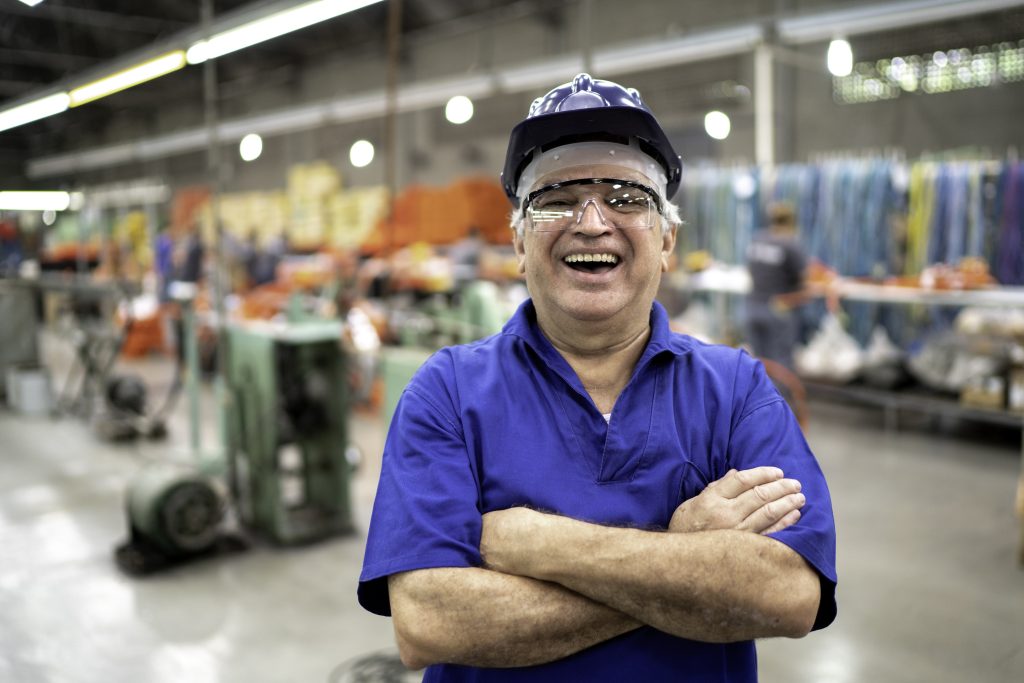
The Society of St. Vincent de Paul (SVdP) Des Moines Council wants people to know that just because they may have been born into poverty, that doesn’t mean they have to spend their lives on the brink. The Council’s Back2Work program helps those interested in improving their lives to tap into their God-given potential, break the cycle of poverty, and live lives full of purpose. The program is meant to help participants with a history of substance abuse, mental health challenges, or incarceration overcome barriers to self-sufficiency.
Back2Work helps them re-enter the workforce and earn a livable wage — all while learning a new job and marketable skills. Back2Work includes two weeks of pre-employment training, and then six months of on-the-job training — along with classes at SVdP that cover topics such as healthy relationships, financial literacy, and career coaching. The Council also coordinates with Catholic Charities to provide participants with counseling and mental health support.
This is all part of an effort to give people holistic, wraparound support so that they can succeed long-term. Once training is over, participants receive follow-up and additional support. SVdP often helps them set up continuing education classes — such as ESL or HiSET — so they can keep moving forward on their career path.
Back2Work participants usually land jobs in fields such as electrical work, landscape, hospitality, manufacturing, and healthcare. 90% are employed at $18.25 an hour — and in Des Moines, that kind of steady income can help buy groceries, a car, and even a home. It can help an entire family escape generational poverty.
In addition to Back2Work, SVdP Des Moines runs a Reentry program that works with incarcerated individuals. With a more one-on-one focus, this program provides people with professional training and mentorship and helps them troubleshoot potential barriers to success like transportation, housing, and access to healthy choices. Thanks in large part to this program, the Des Moines region has a significantly lower recidivism rate than the rest of the state.
Published in Catholic News Agency Apr 5, 2025
The Society of St. Vincent de Paul USA (SVdP) celebrated the opening of its brand-new advocacy office on Capitol Hill on Friday afternoon.
Cardinal Christophe Pierre, apostolic nuncio to the United States, attended the ribbon-cutting ceremony and blessed the new office, calling on the Holy Spirit to “ignite the talents and gifts of everyone present” for the purpose of serving the poor.
“Compassionate God, may your peace always stay in this office, making it a place where we can each grow in friendship with you, with one another, and with all guests who gather with us in this place. Give us grateful hearts so that we will always be mindful of generosity and goodness to us,” the nuncio said during the blessing.
“May our new office always be a source of healing and hope to those who need your mercy and kindness,” he continued. “Give us the grace to live the mission and values of the society so that we will be worthy to bear the name of our patron St. Vincent de Paul. This we ask in the name of your son, Jesus Christ.”
The organization announced earlier this year during the Catholic Social Ministry Gathering that it would open a second national office, which is located on Maryland Avenue, as a part of its efforts to “raise the profile of key issues related to homelessness” to politicians on Capitol Hill.
The Society of St. Vincent de Paul USA served over 5 million people across the country last year, distributing more than $1.4 billion in aid, including $60 million in emergency financial assistance to prevent evictions and ensure people are able to remain housed.
Ingrid Delgado will head the D.C. office as SVdP USA’s new director of public policy and advocacy. Prior to taking on her new position this month, Delgado served for four years as associate director of government relations for the U.S Conference of Catholic Bishops.
“In January during the Catholic Social Ministry Gathering [SVdP USA President John Berry] announced the opening of this office, [and] I was so excited,” Delgado told CNA. “Little did I know that I would soon be here in this position.”
“For the last 12 years, I’ve been doing public policy for the Catholic bishops, which has been just really an honor and a privilege, to do authentically nonpartisan policy for our faith,” she continued. “But to now do it for this organization that is in direct service and relationship with our most vulnerable brothers and sisters is just, for me personally, a really exciting opportunity.”
Delgado said she believes now is “a really crucial time” to bring the stories of poor and vulnerable communities that SVdP USA serves before members of Congress, especially as conversations surrounding budget cuts to social services like SNAP (Supplemental Nutrition Assistance Program) and Medicaid continue.
“I am hoping to bring the stories of people that Vincentians serve and the experiences of the Vincentians of what that means for our communities if those critical services are cut,” Delgado said.
“My hope is that we will build a reputation with all of our elected officials as just a resource for our elected officials so that when they just need to know information about their constituencies, about people who are struggling and who are in need in their districts, that they will come to the Society of St. Vincent de Paul as a trusted resource and partner,” she said.
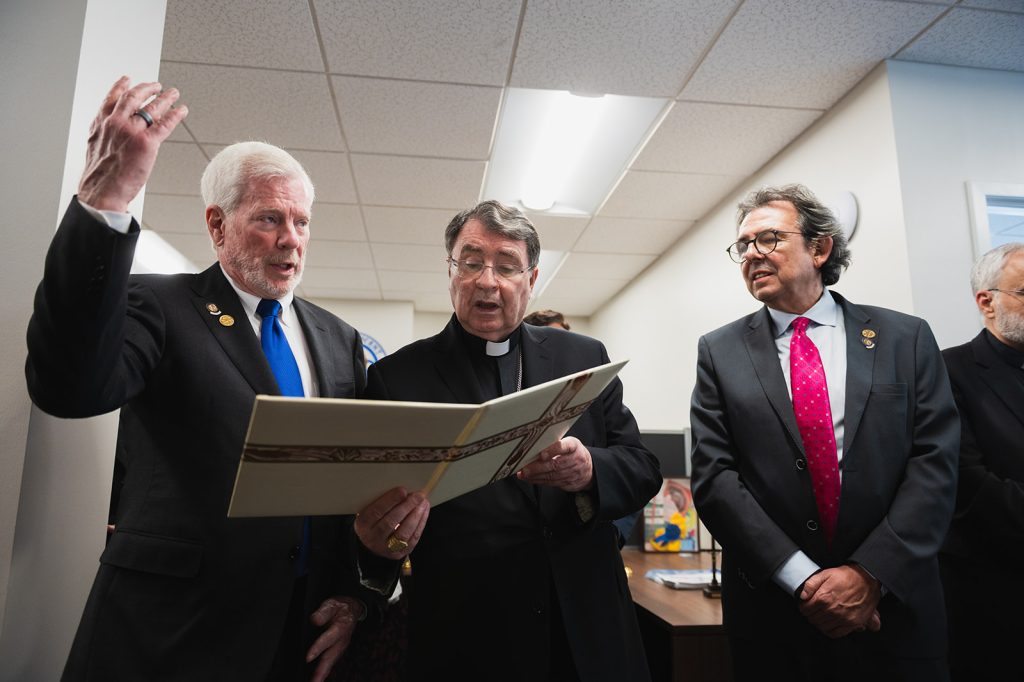
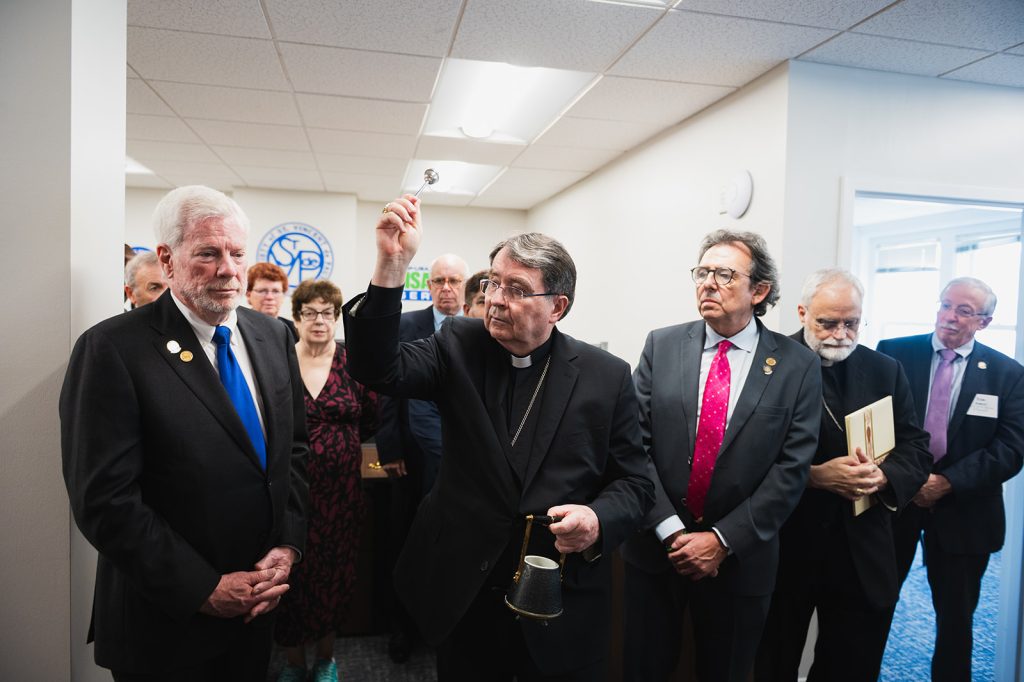
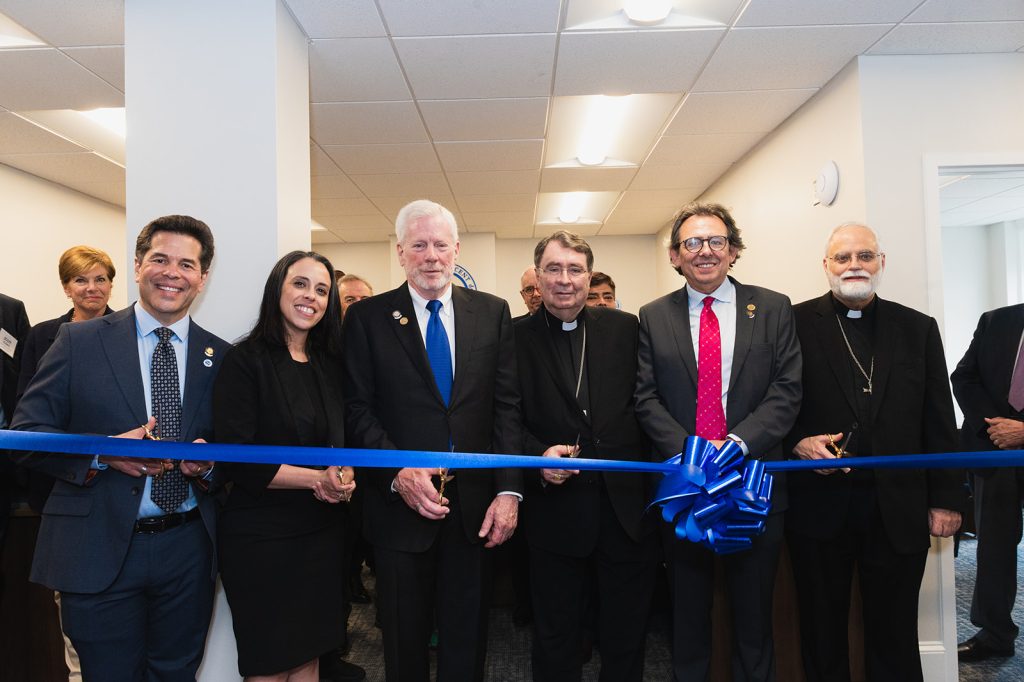
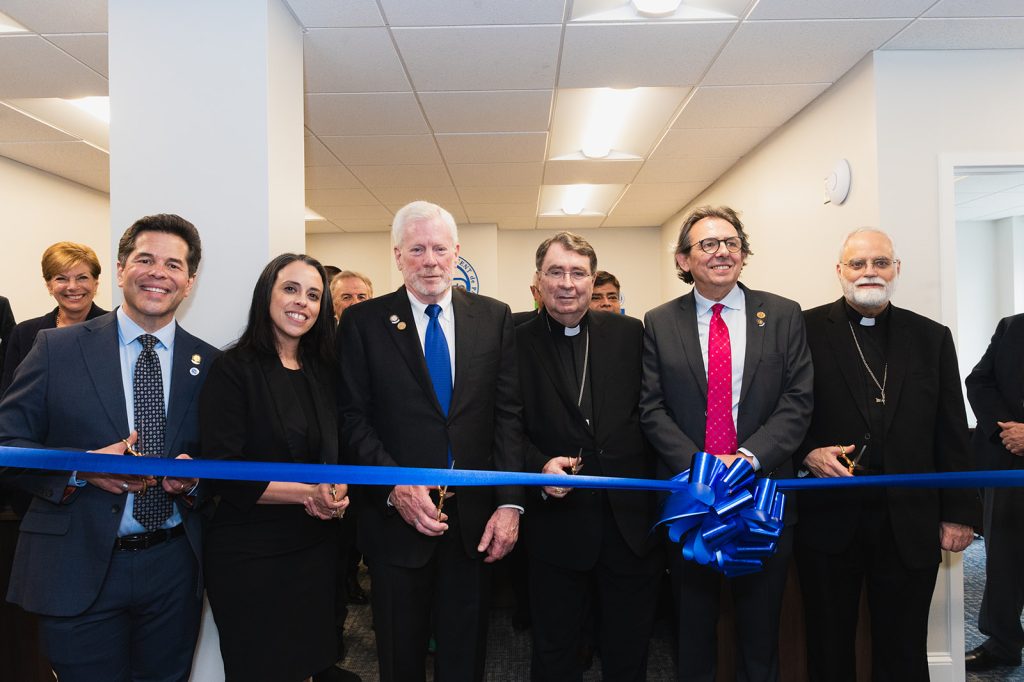
On Friday, April 4, the Society of St. Vincent de Paul USA (SVdP) officially opened its new office in Washington D.C. as it seeks to ramp up efforts to advocate for those on the margins. As one of the largest lay Catholic organizations in the nation, SVdP hopes having a permanent presence in Washington D.C. will help its efforts to raise the profile of key issues related to poverty, while advocating to policymakers on behalf of those who experience its daily effects.
The office will be led by Ingrid Delgado, SVdP’s first National Director of Public Policy and Advocacy and formerly the Associate Director of Government Relations at the U.S. Conference of Catholic Bishops.
The Grand Opening Ceremonies began with Mass celebrated by Cardinal Wilton Gregory at the Vincentian Chapel at the National Shrine of the Immaculate Conception.
Then the ribbon cutting ceremony was held at the new office space at 110 Maryland Avenue, NE Suite 506, Washington DC 20002, which is located just steps away from the United States Supreme Court. National President John Berry provided some opening remarks, and introduced special guests to the event, before the ribbon cutting to mark the opening of the office.
In attendance was International SSVP President Papal Nuncio, Archbishop Andrew Bellissario, National CEO Michael Acaldo, new National Director of Public Policy and Advocacy Ingrid Delgado, the SVdP USA Board of Directors, and the SSVP-CGI International Board of Directors.
Last year, SVdP USA served more than 5 million people across the U.S. and provided more than $1.7 billion in aid, including $60 million in emergency financial assistance to prevent evictions and keep people housed. Often known for the thrift stores in cities and towns around the country, SVdP offers programs that are tailored to the specific needs of the communities it serves. Learn more about joining in our work at svdpusa.org.
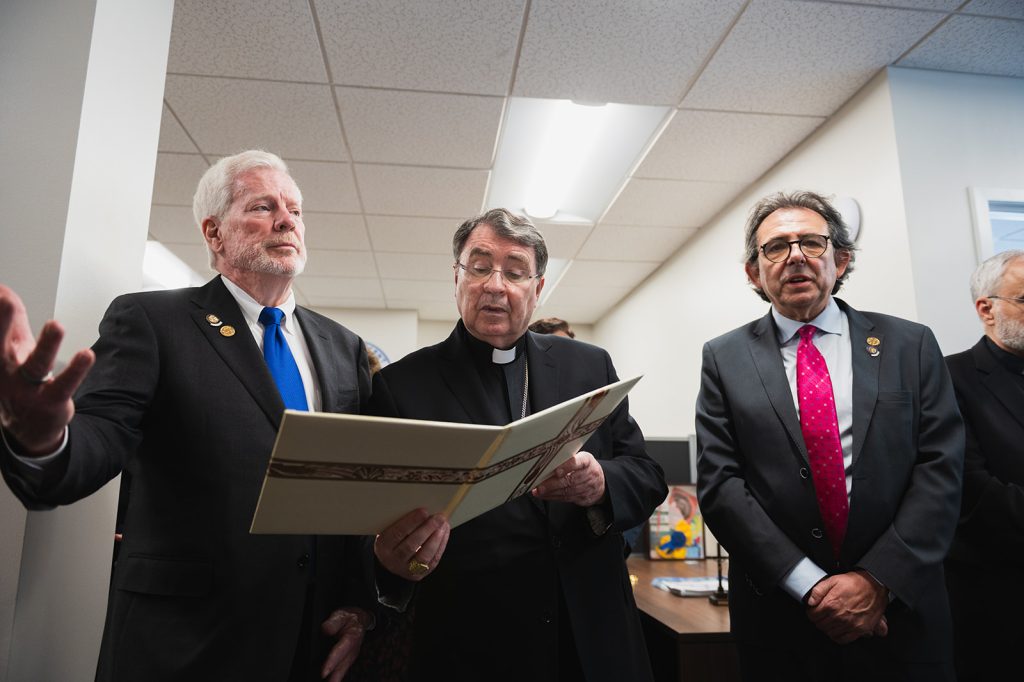
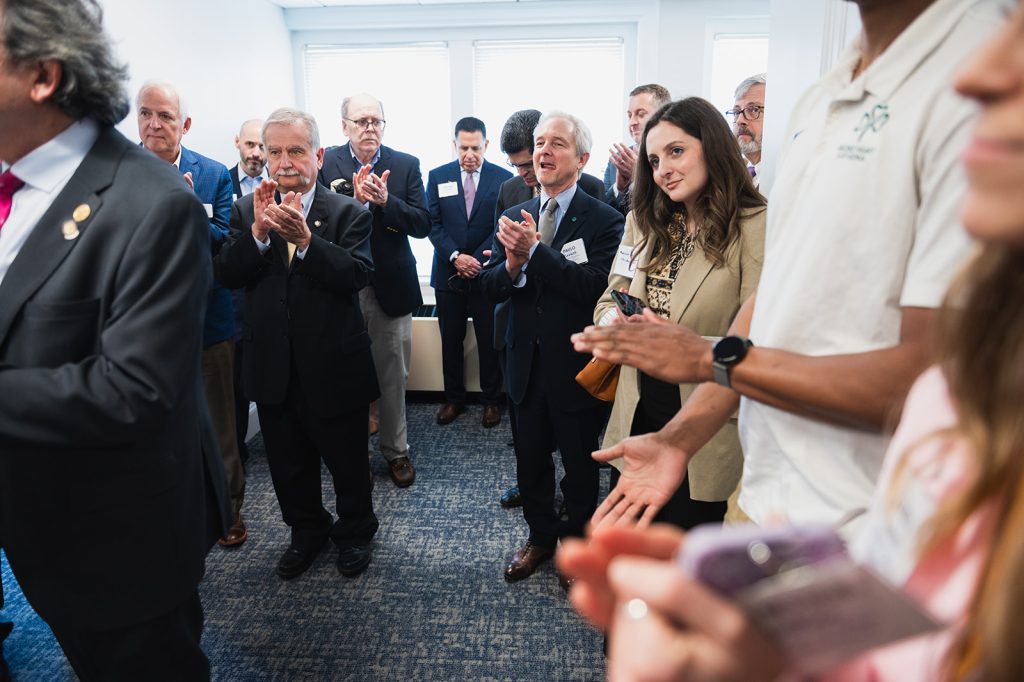
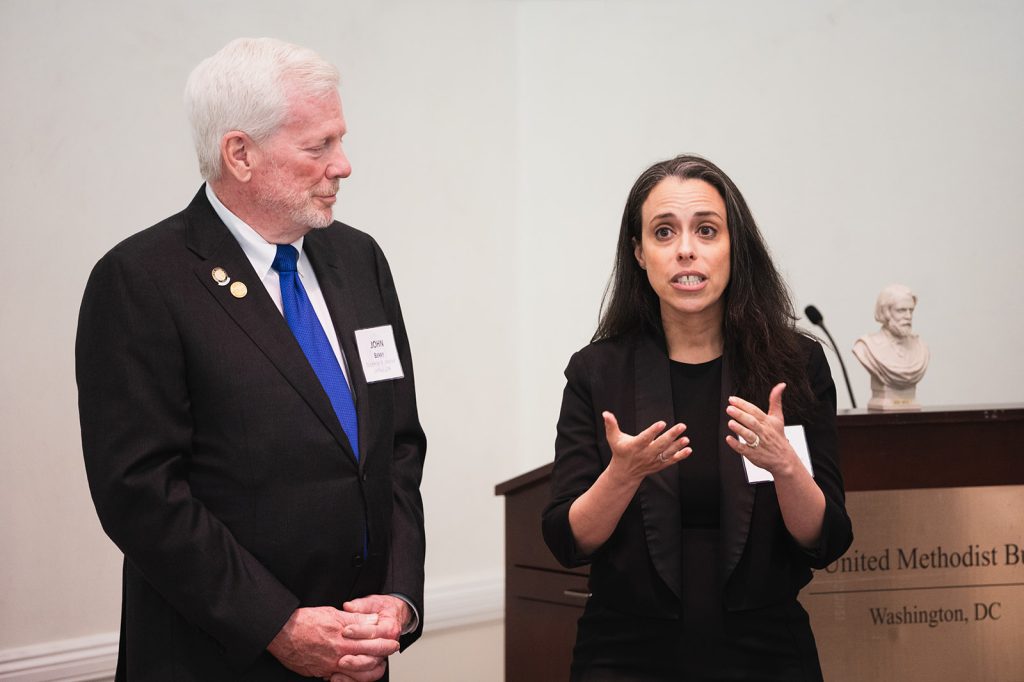
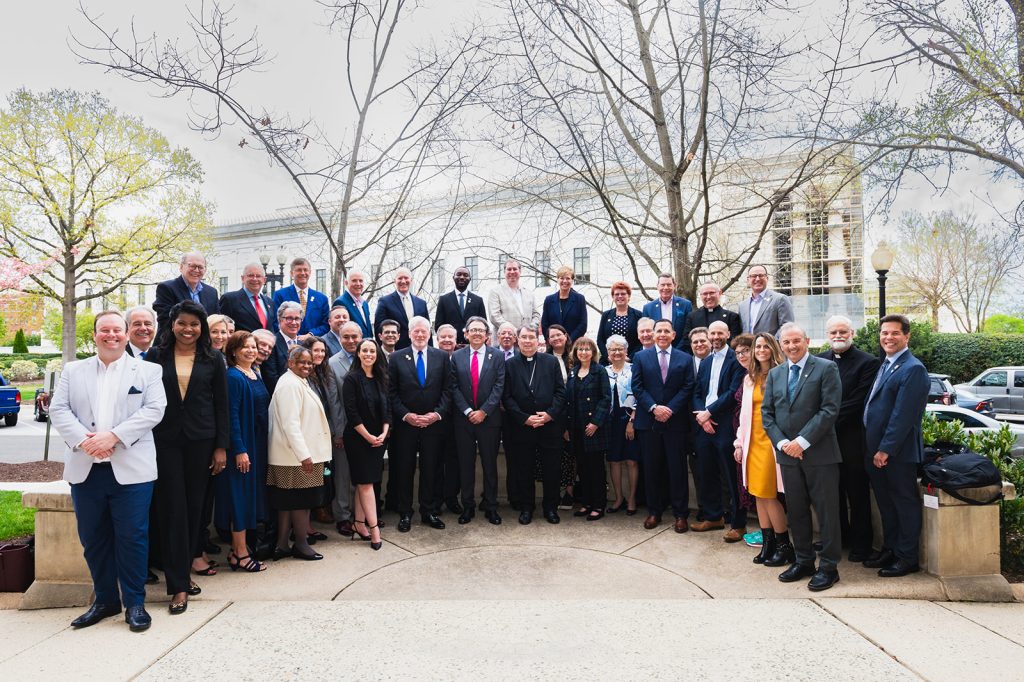
Gregg Colburn is the Marsha and Jay Glazer Endowed University Professor and Associate Professor in the Runstad Department of Real Estate in the College of Built Environments at the University of Washington. He publishes research on topics related to housing and homelessness and is co-author of the book, Homelessness is a Housing Problem: How Structural Factors Explain U.S. Patterns. Gregg is also co-author of the recently released book, Affordable Housing in the United States. His research has been featured in leading media outlets, including The Atlantic, The New York Times, The Economist, Bloomberg, and National Public Radio.
Gregg holds an M.B.A. from Northwestern University, and a M.S.W. and Ph.D. from the University of Minnesota. Prior to academia, he worked as an investment banker and private equity professional. At the University of Washington, Gregg teaches classes in housing, urban economics, and finance. Gregg serves as co-chair of the University of Washington’s Homelessness Research Initiative and is a member of the National Alliance to End Homelessness Research Council.
Andrew Abela is the founding dean of the Busch School of Business and Ordinary Professor of Marketing at The Catholic University of America, in Washington, D.C. He is a faculty affiliate at the Harvard University Human Flourishing Program and a Contributor at Forbes.com. His research on the integrity of the marketing process, including marketing ethics, Catholic Social Doctrine, and internal communication, has been published in several academic journals, including the Journal of Marketing, the Journal of the Academy of Marketing Science, the Journal of Business Ethics, and the Journal of Markets & Morality, and in two books. He is the winner of the 2009 Novak Award, a $10,000 prize given by the Acton Institute for “significant contributions to the study of the relationship between religion and economic liberty.” His two most recent books are Super Habits: The Universal System for a Successful Life from Sophia Press and A Catechism for Business from Catholic University Press.
Dr. Abela also provides consulting and training in internal communications to Fortune 100 corporations. Prior to his academic career, he spent several years in industry as brand manager at Procter & Gamble, management consultant with McKinsey & Company, and Managing Director of the Marketing Leadership Council of the Corporate Executive Board. He holds a B.Sc. from the University of Toronto, an MBA from the Institute for Management Development (IMD) in Switzerland, and a Ph.D. in Marketing and Ethics from the Darden Business School at the University of Virginia. He and his wife, Kathleen, have six children, three of whom (so far) have graduated from Catholic U.
140 North 4th Street
Louisville, KY 40202
SVdP Group Rate: $179 per room, per night, plus taxes. To book a room at The Galt House, you can use this booking link: The Galt House Hotel. Group rate expires, August 1, 2025!
Rooms booked under the group block are eligible for a discount of $10 off of self-parking the parking discount or $10 for self-parking. Current self-parking rate is $30 per day.
Located in downtown Louisville, the hotel is approximately 9 miles from Louisville International Airport (SDF).
Transportation is available from the airport to The Galt House via Taxi, Uber, Lyft.
Southwest Airlines is pleased to offer 2025 SVdP National Assembly attendees discounted fares. To utilize the discount, book via SWABIZ® using this link. Discount valid for travel 8/23/2025 to 9/2/2025.
Stephanie Land’s bestselling debut memoir Maid: Hard Work, Low Pay, and a Mother’s Will to Survive recounts her harrowing saga as a single mom navigating the poverty trap. It depicts her life at age 28 when she and her seven month-old have to move into a homeless shelter fleeing a violent home, begins the bureaucratic nightmare of applying for food stamps and subsidized housing, and starts cleaning houses for $9/hour. Her unflinching testimony exposes the physical, economic, and social brutality that domestic workers face, all while radiating a parent’s hope and dedication.
Praised for its raw portrayal of poverty and systemic inequality, Maid inspired the Emmy and Golden Globe nominated Netflix series of the same name, reaching over 67 million households, in which Land served as an executive producer on the show. Her follow-up memoir, Class: A Memoir of Motherhood, Hunger, and Higher Education, continues her story as a single mother navigating college and poverty.
Land writes on economic justice, domestic abuse, and motherhood, with work featured in major outlets like The New York Times, The Guardian, and The Atlantic. She is a fellow at the Center for Community Change and an ambassador for the National Domestic Workers Alliance. She is currently working on her third book, The Privilege to Feel.
